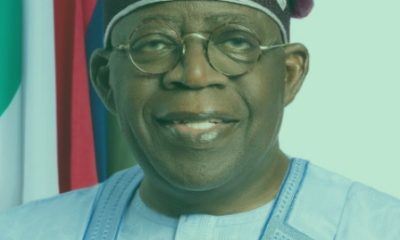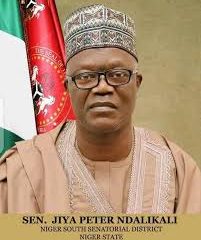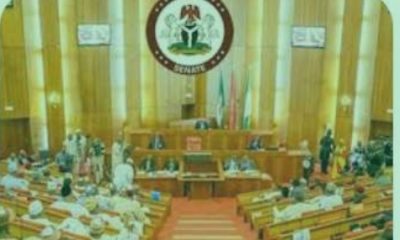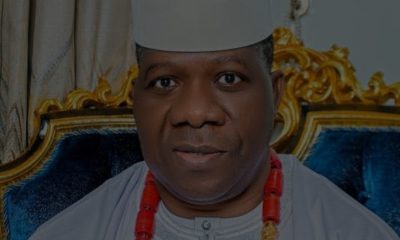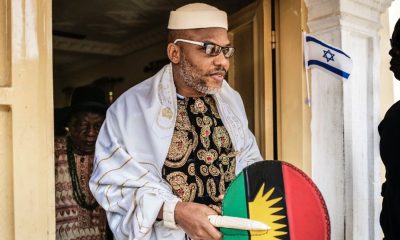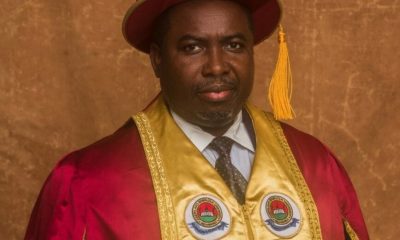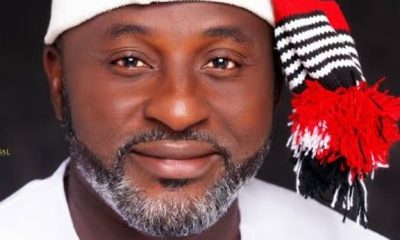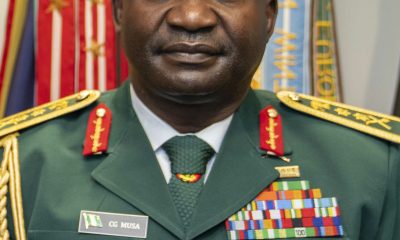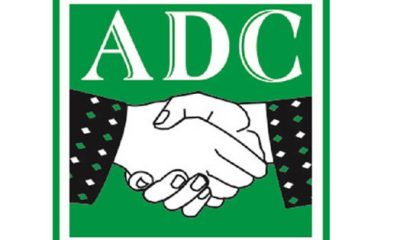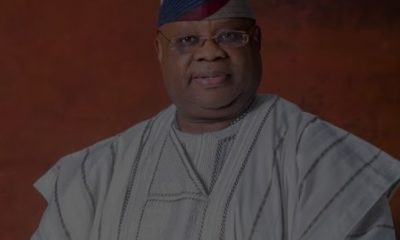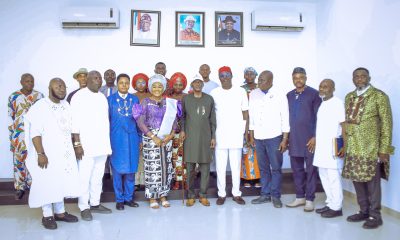Politics
International Diplomacy: Korea Africa Summit OpensNew Vista in Multilateral Relations -Launches Critical mineral Initiatives -Pledges $10 billion in development aid for Africa -AfDB commends Korea as development accelerator in Africa

By George Mgbeleke
Korean and Africa leaders attends the inaugural Korea Africa summit commits to “Critical Minerals Initiative”aimed at fostering sustainable development in Africa writes, Yucee Uwah and Emman Ozoemenawith agency reports.
The inaugural Korea-Africa summit 2024 held June 4 to 5, 2024 atKINTEX in Ilsan, north of Seoul, South Korea with African leaders pledging to scale trade relations and development aid to an all-time high.
The leaders adopted a joint declaration on boosting trade and investment, cooperation in critical minerals and development projects, and collaboration on the global stage.
South Korean President Yoon Suk Yeol and Africa leaders representing 48 African countries agreed on Tuesday, June 5 2024 to forge deeper trade and investment cooperation, when it agreed on a new agenda“critical minerals dialogue” aimed at fostering sustainable development of the continent’s resources.
The summit, the first in the history of Korea Africa relations of over 60 years, since Korea opened diplomatic and trade relations with African countries is coming in the heels of increasing call for deepening trade and development aid between Korea and Africa.
As the host of this auspicious summit, South Korea President Suk Yoel said
“The Critical Minerals Dialogue launched by South Korea and Africa will set an example for a stable supply chain through mutually beneficial cooperation and contribute to sustainable development of mineral resources around the world,” Yoon said in his closing remarks.
“Korea is scaling relations with Africa across broad spectrum of sectors in response to emerging opportunities.
Hosting a first-ever summit with the leaders of 48 African nations, Yoon said South Korea would increase development aid for Africa to $10 billion over the next six years as it looks to tap the continent’s rich mineral resources and potential as a vast export market.
He also pledged to offer $14 billion in export financing to promote trade and investment for South Korean companies in Africa.
South Korea is one of the world’s largest energy buyers and is home to leading semiconductor producers. It is also home to the world’s fifth-largest automaker, Hyundai Motor Group, which is making a push for electrification.
Partnering with Africa, which has 30% of the world’s reserves of critical minerals including chrome, cobalt and manganese is crucial, Yoon’s office has said.
In a joint declaration issued by South Korea, the African Union (AU) and its member nations, the leaders pledged to speed up talks for economic partnership agreements and trade and investment promotion frameworks.
They also called for advancing cooperation for Africa’s food security with South Korea’s support with agricultural technology and smart farming.
African leaders welcomed the South Korea’s “Tech4Africa” initiative aimed at supporting the education and training of Africa’s young population.
AU Chairperson and Mauritanian President Mohamed Ould Ghazouani, at a joint news conference with Yoon, said African countries were looking to learn from Korea’s experience in developing human resources, industrialisation, and digital transformation.
Vast and Fast Growing Market
Yoon said 33 heads of state participated in the summit. This huge
attendance is significant in view of the emerging efforts consolidate the existing trade relations, investment opportunities as well as expanding opportunities in relations between Korea and Africa.
Yoon has proposed “shared growth” as a pillar of cooperation with the continent and said the leaders agreed to expand trade and investment by establishing institutional frameworks to facilitate them.
By reaching out with offers to help with industrial infrastructure and digital transformation, South Korea is trying to tap into a vast and fast-growing market that is home to 1.4 billion people, the majority of whom are 25 or younger.
The joint declaration said the leaders recognised the instability of global supply chains, and that future industries increasingly depended on the stable supply of mineral resources.
“In this context, we agree to launch the Korea-Africa Critical Minerals Dialogue during this summit which will serve as an important institutional foundation for enhancing cooperation between Korea and Africa,” it said.
Park Jong-dae, a former South Korean ambassador to South Africa and Uganda, arguedthat Western and Chinese models of development had failed African nations, and South Korea offered a valuable alternative path.
“The essence of the Korean model of development cooperation is human development, and about management, rather than about provision of assistance per se,” he said.
“Korea has the experience and know-how of development … while many African countries have immense possibilities for development based on yet to be explored, untapped resources and endowment, and dynamic young population,” he said.
On Wednesday, South Korean business leaders hosted a business summit focused on investment, industrial development, and food security.
Yoon separately held talks with 25 leaders on the sidelines of the summit, his office said.
Yoon agreed with the leaders of Tanzania to provide $2.5 billion concessional loans and Ethiopia for $1 billion financing to go to infrastructure, science and technology and health and urban development.
Additionally, Kenyan President William Ruto disclosed that South Korea would provide $485 million concessional development funding.
African Development Bank Commends Korea
In an address to delegates at the summit, the African Development Bank (AfDB)President, Adewunmi Adesina commended Korea’s inspiring and determined development journey, that transformed “a poor and aid-dependent country” into “one of the largest donor countries in the world.”
Adesina highlighted the deep relationship between Korea and the Bank, starting from 1982 when Korea became a member of the Bank. Since then, he said, Korea “has contributed close to $795 million to the Bank, the African Development Fund and the Korea Trust Fund.”
“You are investing in the right institution: the African Development Bank,” he declared.
Rwanda’s President Paul Kagame said Korea’s experience shows a country can be radically transformed in the course of a generation. “Is there any reason Africa hasn’t become a high-income region?” he posed.
The United Republic of Tanzania President, Samia Suluhu Hassan called for investment in clean cooking agenda as part of the just energy transition. She said investment in clean cooking will lower emissions, deforestation and respiratory diseases that affect especially women and children.
“We are working with Dr Adesina (President of the African Development Bank) to fundraise for this agenda,” she said.
President William Ruto publicly acknowledged the African Development Bank’s financial innovations. He told Korea to consider channeling some of the SDRs through the African Development Bank.
Mapping the future
According to the summit organizers, 33 African heads of state and government participated at the summit, while 48 African countries had their delegations at the summit.
Over the years, Korea continues to scale up its trade relations and investment across Africaas well as the official development aid (ODA) portfolio, which supports sustainable livelihood for millions of peoples in Africa providing them accessto clean and renewable energy, agriculture productivity, technology, and skills for women and youth.
The Republic of Korea will commit $14 billion in export financing to support Korean companies investing in Africa while increasing its official development assistance (ODA) to $10 billion by 2030.
Analysts express optimism that the commitments by the leaders will drive development and prosperity in Africa and Korea that will be mutually beneficial to all partners involved in this multilateral agreements.
Politics
HURIWA Slams FG, IGP, Army Chief for Turning Abuja Into War Zone Over Peaceful Pro-Kanu Protest
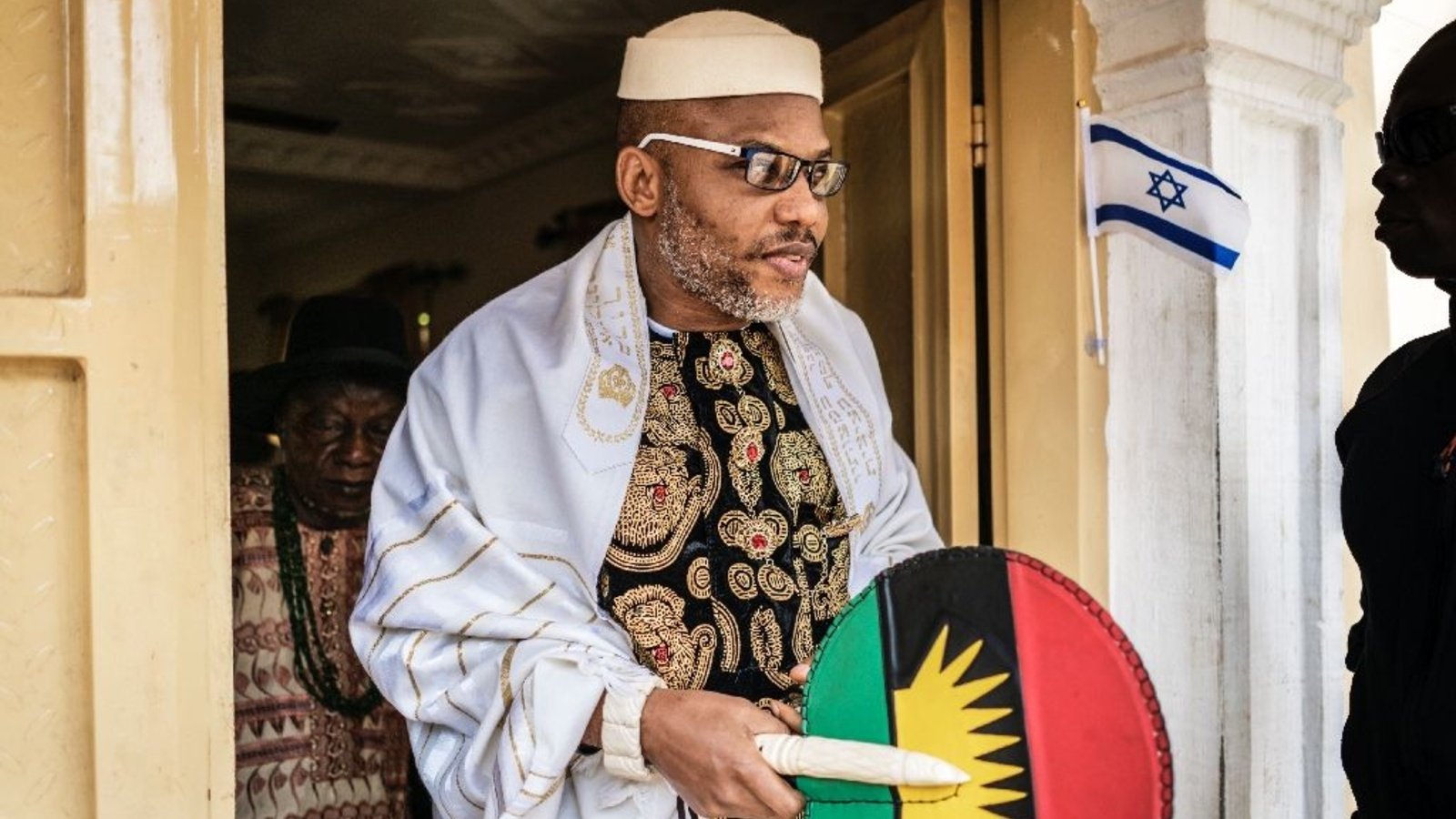
By George Mgbeleke
The Human Rights Writers Association of Nigeria (HURIWA) has come down heavily on the Federal Government, the Inspector-General of Police, and the Chief of Army Staff, over what it described as a shameful, lawless, and dictatorial clampdown on peaceful Nigerians who gathered in Abuja to demand justice and the release of Mazi Nnamdi Kanu.
The Association said the disgraceful show of force witnessed in the Federal Capital Territory on Monday was proof that the Nigerian government under President Bola Ahmed Tinubu is descending deeper into militarized tyranny, where peaceful dissent is treated as treason and citizens are ruled through fear instead of justice.
HURIWA said it was both “laughable and tragic” that an entire capital city could be locked down simply because a handful of young Nigerians said they would march peacefully to ask for justice. “Why is the government this afraid of its own people?” the group asked. “What is it hiding? Only leaders with unclean consciences fear the sight of citizens expressing themselves. Only dictators, tyrants, and looters of public funds are terrified of seeing hungry, frustrated Nigerians pour into the streets to speak truth to power.”
The rights group described as “insanity in uniform” the deployment of hundreds of soldiers, armored vehicles, and police patrol teams across major routes in Abuja, turning what should have been a peaceful civic action into a tense military siege. It said the reckless action of the security agencies crippled economic and commercial activities across the city; banks were shut, filling stations stopped dispensing fuel, commuters were stranded, and private businesses lost billions of naira in a single day.
HURIWA blamed the chaos on the paranoid conduct of the Police and the Army, accusing both institutions of creating unnecessary panic and tension. “The protesters were not armed, not even with a stone,” it said. “Yet live ammunition and tear gas were fired at harmless citizens. The government must explain why such unconstitutional brutality was unleashed on people whose only ‘crime’ was demanding justice.”
The Association also faulted the security advisory issued by the United States Embassy warning its citizens to stay away from the protest venues, describing it as “a foreign conspiracy against Nigeria’s democracy.” It questioned why a sovereign government would allow itself to be guided by what it called “a baseless, imported panic message” to justify domestic repression. “Did Nigerians invite Americans to the protest? Did they plan to storm the US Embassy? That advisory was totally irrelevant, yet the government used it as an excuse to flood Abuja with troops. It smacks of complicity,” HURIWA declared.
The group warned that the government’s growing intolerance for peaceful protests is a dangerous provocation that could one day spiral out of control. “If you keep pushing citizens to the wall, they will fight back,” HURIWA cautioned. “No government can suppress the people forever. Hunger and injustice will always find a voice. Nigeria is not a military barracks; it is a democracy; at least, it is supposed to be.”
It accused the Tinubu administration of ruling with fear and intimidation, saying the clampdown exposed an embarrassing level of insecurity within government circles. “Even if protesters marched toward Aso Rock, they could never breach its walls. That place is impenetrable and heavily guarded. So, what exactly is the government afraid of? The truth?” HURIWA asked.
The group demanded that the Federal Government immediately halt the use of soldiers for crowd control, release all arrested protesters without delay, and pay compensation to business owners whose operations were crippled by the security lockdown. It also urged the National Human Rights Commission and international human rights bodies to launch independent probes into the violent disruption of the protest.
HURIWA further warned that Nigeria’s democracy is being choked by a leadership that mistakes citizens’ cries for justice as threats to its survival. “This is not the democracy Nigerians fought for,” the statement said. “When a government uses live bullets on its own people for daring to ask questions, it has lost moral legitimacy. Those who are clean do not fear accountability. It is those with blood and corruption on their hands who tremble at the voice of the people.”
The Association reiterated that peaceful protest is a constitutional right, not a privilege. It said the continued militarization of civic spaces will only deepen public resentment and erode trust in government institutions. “No government that silences its people can ever claim to be democratic,” HURIWA said. “Nigeria’s rulers must stop this war on citizens and start governing with conscience.”
Politics
When Transparency Becomes Luxury: INEC and ₦1.5B FOI Controversy
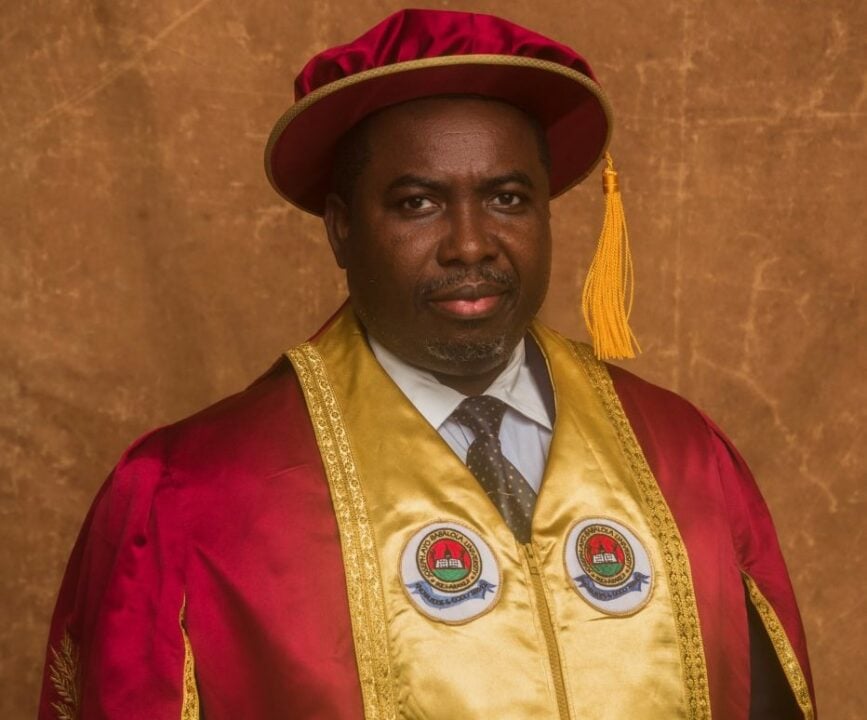
When Transparency Becomes Luxury: INEC and ₦1.5B FOI Controversy
By Chike Walter Duru
When the Independent National Electoral Commission (INEC) recently demanded a staggering ₦1.5 billion from a law firm for access to the national register of voters and polling units, many Nigerians were left bewildered. The request was made under the Freedom of Information (FOI) Act, 2011 – a law designed to make public records accessible, not to commercialize them. INEC’s justification, couched in legalese and bureaucratic arithmetic, raises a deeper question: Is Nigeria’s electoral umpire genuinely committed to transparency and accountability?
At the heart of this controversy is a simple statutory principle. Section 8(1) of the Freedom of Information Act clearly stipulates that where access to information is granted, the public institution may charge “an amount representing the actual cost of document duplication and transcription.” The framers of this law envisioned modest fees; not financial barriers.
INEC, however, appears to have stretched this provision beyond reason. By invoking its internal guideline of ₦250 per page, the Commission arrived at the colossal figure of ₦1,505,901,750 for 6,023,607 pages – supposedly the total pages needed to print the entire national voters’ register and polling unit list. It is a mathematical exercise that may be sound on paper, but absurd in context and intent.
Let us be clear: transparency is not a privilege that comes with a price tag. It is a fundamental right. The Freedom of Information Act exists precisely to ensure that institutions like INEC cannot hide behind bureaucracy or cost to deny citizens access to information that belongs to them.
INEC’s justification, however elaborate, falls flat against the law’s overriding provisions. Section 1(1) of the FOI Act affirms every Nigerian’s right to access or request information from any public institution. More importantly, Section 1(2) establishes that this right applies “notwithstanding anything contained in any other Act, law or regulation.” This means that no internal guideline, regulation, or provision of the Electoral Act can supersede the FOI Act, within the context of access to information.
By relying on Section 15 of the Electoral Act 2022 and its own “Guidelines for Processing Certified True Copies,” INEC seems to have elevated its internal processes above a federal statute – a position that is both legally untenable and administratively misguided.
Civil society organisations have rightly condemned INEC’s response. The Media Initiative Against Injustice, Violence and Corruption (MIIVOC) called the fee arbitrary and unlawful, while the Media Rights Agenda (MRA) described it as a deliberate attempt to frustrate legitimate requests under the FOI Act. These reactions are not misplaced. Charging ₦1.5 billion for public records is tantamount to weaponising cost – turning what should be a transparent process into a pay-to-play system.
The Attorney-General of the Federation’s FOI Implementation Guidelines pegged the standard charge for duplication at ₦10 per page. Even at that rate, printing the same documents would not amount to anything close to ₦1.5 billion. Moreover, in an age of digital data, it is difficult to believe that the only way INEC can share information is through millions of printed pages.
It is worth noting that the National Register of Voters is a digital database – already compiled, stored, and backed up electronically. The polling unit list is also digitised and publicly available. What, then, justifies this astronomical fee?
Democracy thrives on openness. The credibility of any electoral body depends not just on the conduct of elections, but also on the degree of public confidence in its processes. If the cost of accessing basic electoral data runs into billions, how can civil society, researchers, or ordinary citizens participate meaningfully in democratic oversight?
The African Commission on Human and Peoples’ Rights’ Guidelines on Access to Information and Elections in Africa (2017) are explicit: election management bodies must proactively disclose essential electoral information, including voters’ rolls and polling unit data. Nigeria, as a signatory to this framework, is obligated to promote – not restrict access to such information.
By placing financial barriers in the way of public access, INEC risks undermining not only its own credibility but also Nigeria’s broader democratic integrity. Transparency should not be a privilege of the rich or the powerful. It should be a right enjoyed by all.
This incident presents an opportunity for reflection and reform. INEC must immediately review its internal cost guidelines for information requests and align them with the FOI Act and the Attorney-General’s Implementation Guidelines. More importantly, it should embrace proactive disclosure by publishing the national register of voters and polling units in digital formats that are freely accessible to the public.
There is no reason why information already stored electronically should require billions to access. Doing so not only contravenes the spirit of the FOI Act but also erodes public trust in the Commission’s commitment to open governance.
Access to information is the lifeblood of democracy. It empowers citizens to hold institutions accountable and ensures that governance remains transparent. INEC’s ₦1.5 billion charge is not merely excessive; it is a dangerous precedent that could embolden other public institutions to commercialize public data and silence scrutiny.
If Nigeria must advance its democratic gains, the culture of secrecy and bureaucratic obstruction must give way to openness and accountability. INEC should lead that transformation, not stand in its way.
The Commission owes Nigerians not just elections, but the truth, transparency, and trust that sustain democracy.
Dr. Chike Walter Duru is a communications and governance expert, public relations strategist, and Associate Professor of Mass Communication. He chairs the Board of the Freedom of Information Coalition, Nigeria. Contact: walterchike@gmail.com
Politics
ICON Hon. (Chief) Amobi Godwin Ogah, a Distinguished Nigerian and An ICON
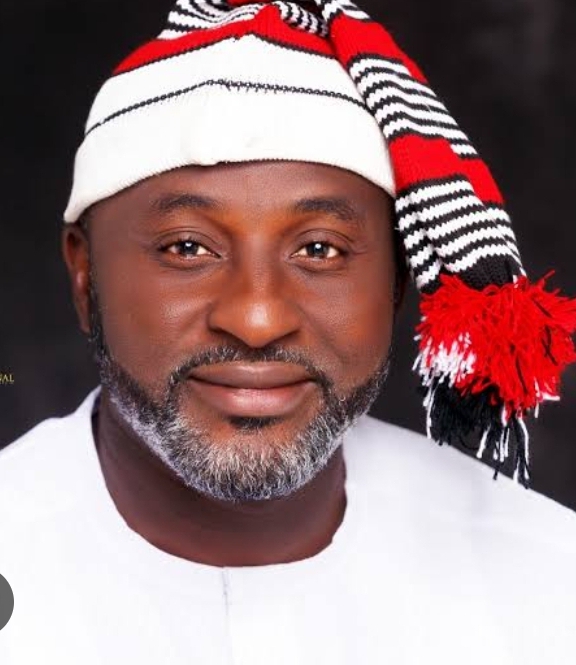
ICON
Hon. (Chief) Amobi Godwin Ogah, a Distinguished Nigerian and An ICON
By IGNATIUS OKOROCHA
Hon (chief) Amobi Godwin Ogah is a member of the 10th House of Representatives,representing Isuikwuato/Umunneochi Federal Constituency, Abia State and
Chairman, House Committee on HIV/AIDS, Tuberculosis and Malaria Control.
Born on the 16th of June, 1980, in the peaceful town of Onuaku, Uturu, in Isuikwuato Local Government Area of Abia State, Hon. (Chief) Amobi Godwin Ogah is a distinguished Nigerian lawmaker, entrepreneur, philanthropist, and grassroots mobilizer.
Before he joined mainstream politics, Hon Ogah was the Executive Director of seven subsidiary companies under Pauli-Mama Group of Companies.
His passion for service and development has consistently marked his journey, from private enterprise to the hallowed chambers of Nigeria’s National Assembly.
A proud son of Abia State, Hon. Ogah currently represents the Isuikwuato/Umunneochi Federal Constituency in the House of Representatives, where he also serves as the Chairman of the House Committee on HIV/AIDS, Tuberculosis, and Malaria Control—a critical role at the intersection of health policy and human development.
LEGISLATIVE IMPACT
Since assuming office, Hon. Ogah has made visible and measurable contributions to national discourse and local development. He has:
Sponsored impactful bills and motions, advocating for better healthcare delivery, youth empowerment, education reform, and rural development.
Championed community-oriented policies that directly benefit his constituency.
Consistently used his voice to demand transparency, equity, and good governance.
DEVELOPMENTAL INITIATIVES
Hon. Ogah believes that leadership is not just about laws—it’s about lives. This belief drives his infrastructural and social interventions across Isuikwuato and Umunneochi, including:
Construction and rehabilitation of rural roads for better access to markets and services.
Donation of learning materials and school infrastructure to underfunded communities.
Provision of portable water and solar-powered street lighting in rural areas.
Healthcare outreaches in partnership with NGOs and public health agencies.
EDUCATION EMPOWERMENT
A firm believer in the transformative power of education, Hon. Ogah recently awarded a full academic scholarship to Miss Okechukwu Mmesoma Josephine, a brilliant indigene of Isuochi, Umunneochi LGA. This scholarship covers tuition, books, and living expenses—an investment in both a future leader and the community at large.
NOTABLE QUOTE
“I was elected to be a voice for the people and a bridge to their dreams. My mission is simple: to serve, to speak, and to deliver.”
— Hon. (Chief) Amobi Godwin Ogah
AWARDS & RECOGNITIONS
For his impactful leadership, Hon. Ogah has received several commendations, including:
Outstanding Legislator Award (House Press Corps, 2024)
Humanitarian Service Award (Abia Youth Assembly)
Recognized as one of the Top 10 Performing First-Time Lawmakers in Nigeria (2025)
PERSONAL LIFE & VALUES
Hon. Ogah is a man of faith, family, and strong ethical grounding. He is married and blessed with children. Known for his humility and accessibility, he maintains close ties to his constituents and is often seen engaging directly with community leaders, youths, and elders alike.
He is also a Chief in his community(Agunecheibe 1 of Uturu)—a title he earned through years of service, philanthropy, and dedication to communal well-being.
LOOKING FORWARD
With unwavering commitment, Hon. Amobi Godwin Ogah remains focused on his core vision: building a constituency where opportunity, infrastructure, and justice work for all. Whether in the chambers of the National Assembly or the streets of Umunneochi and Isuikwuato, his presence continues to inspire hope and progress.
-

 Business & Economy2 months ago
Business & Economy2 months agoPC-NCG Issues Disclaimer on Purported Nigerian Coast Guard National Orientation Exercise In Anambra State
-

 Entertainment1 year ago
Entertainment1 year agoJubilation galore as Parishioners of CKC Kurudu celebrate their cultural heritage ….FG should exploit our Cultural heritage to unite Nigerians-Rev Fr Dim
-

 Law & Crime4 months ago
Law & Crime4 months agoICPC pledges to collaborate with FIDA to end Sex for Marks in tertiary institutions
-

 General News1 year ago
General News1 year agoCelebration galore as UDA Successfully Elected New Exco ……I will digitalize processes that will raise UDA to greater height -Comr. Okejiri
-

 General News1 year ago
General News1 year agoReps hold public hearing on FMC Ugwuaji Awkunanaw
-

 Law & Crime3 months ago
Law & Crime3 months agoLegal practitioner raises alarm over threat to his life by CSP Muhammed Abdulkareem
-

 General News1 year ago
General News1 year agoKugbo Hill Tragedy: Trailer Crushes Car, Kills Four and Injures Several Others in Abuja
-

 Uncategorized9 months ago
Uncategorized9 months agoBenue govt drags NDIC to Federal High Court over illegal sell of shares …Demands N2.6billion damages




